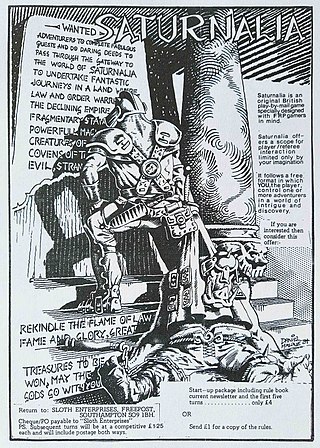Related Research Articles

A play-by-mail game is a game played through postal mail, email or other digital media. Correspondence chess and Go were among the first PBM games. Diplomacy has been played by mail since 1963, introducing a multi-player aspect to PBM games. Flying Buffalo Inc. pioneered the first commercially available PBM game in 1970. A small number of PBM companies followed in the 1970s, with an explosion of hundreds of startup PBM companies in the 1980s at the peak of PBM gaming popularity, many of them small hobby companies—more than 90 percent of which eventually folded. A number of independent PBM magazines also started in the 1980s, including The Nuts & Bolts of PBM, Gaming Universal, Paper Mayhem and Flagship. These magazines eventually went out of print, replaced in the 21st century by the online PBM journal Suspense and Decision.
Starweb is a closed-end, space-based, play-by-mail (PBM) game. First published by Flying Buffalo Inc. in 1976, it was the company's second PBM game after Nuclear Destruction, the game that started the PBM industry in 1970. Players today can choose a postal mail or email format. Fifteen players per game assume one of six available roles and explore and conquer planets within a universe comprising 225 worlds. The object of the game is to attain a predetermined number of points which are generated by various actions during gameplay. Multiple game variants are available. Starweb is still available for play as of 2021 through the company Rick Loomis PBM Games.

Legends is a turn-based, role-playing game with a medieval setting. It is currently published in English by Harlequin Games. Jim Landes—owner of Midnight Games, the game's first publisher—began developing the game in 1984, eventually publishing it in December 1989 as a play-by-mail (PBM) game after over a year of playtesting. The initial game comprised a module and game system built on the publisher's existing game, Epic, and was run briefly as Swords of Pelarn before publication as Legends. The first of multiple game modules was Crown of Avalon, which allowed up to 200 players per game. Demand by 1991 was "incredible" according to Bruce R. Daniel in White Wolf. Games could be lengthy, initially between three and ten years of play, settling into an average of three years by 2002.

Saturnalia is a play by mail (PBM) game with a fantasy setting that was first played by students at the University of Southampton before becoming a commercial enterprise in the United Kingdom.

Heroic Fantasy is a computer-moderated, dungeon crawl play-by-mail game. It has been active since 1982 when it was published by Flying Buffalo. The initial edition involved nine dungeon levels. Flying Buffalo published subsequent editions due to challenging gameplay initially, eventually limiting the game to four dungeon levels with a fifth outdoors level where players can assemble an army and capture one or more castles. The game is open-ended; gameplay continues until players decide to stop.
Ad Astra is a play-by-mail game that was published by Superior Simulations. It was a computer moderated, turn-based space fantasy game designed by John M. Ess.
Midgard is an open-end, medieval fantasy play-by-mail game. It was published in 1984 by Time Space Simulations. Through 1996, the game passed through more than four different publishers, including Midgard USA. As of 2022, Talisman Games is the publisher. At initial publication, Midgard was computer moderated with partial human moderation.
CTF 2187 is a closed-end, computer-moderated, play-by-mail (PBM) game that was published by Advanced Gaming Enterprises in the 1980s. It involved teams of robots, of varying size and capabilities, battling on a hex-grid arena with the purpose of defeating the opposing team or their command post. Players assumed the role of a battle robot pilot. The game was tactically-focused, with combat action beginning on the first turn. Games lasted 5–10 turns, or about six months. Players began at the rank of cadet but could spend experience points earned from a completed game to increase in rank for future games, up to the rank of General.
Lords of the Earth (LOTE) is a play-by-email game, first published by Thomas Harlan in 1983 during a growing era of PBM games. Initially played by postal mail, the game featured mixed moderation—computer moderated with some human assistance. By 2002, the publisher processed turns by email (PBeM). Lords of the Earth comprises multiple campaigns, each one a separate game. Campaign 1 is the oldest, set in the mid-1800s in the "Age of Air and Steam". Other campaigns begin from 2000 BCE to 1400 CE. Settings were global in scale, with one campaign featuring an outer space setting.

Galac-Tac is a closed-end, science fiction, play-by-mail (PBM) wargame. It was first published by Phoenix Publications in 1982. By 1990, the publisher had changed its name to Delta Games, and then later to Talisman Games. In 2010, Talisman Games changed ownership and transitioned Galac-Tac to a web-based game. It is still available for play by postal mail or email for those with web access challenges. The game has been updated as well as reviewed multiple times in its 40 years of active play. Various reviews in the 1980s and 1990s provided both positive and negative comments as well as potential areas for the game to improve. The game has been featured numerous times in the modern PBM magazine, Suspense & Decision.

Victory! The Battle for Europe is a closed-end, military strategy, play-by-mail (PBM) wargame. The game was first published by Rolling Thunder Games, Inc. in 1991 after a period of initial growth in the PBM industry. The game centers on Europe while including parts of North Africa, the Middle East, the United States, and Canada. Forty players start each game with equal resources among countries, although geography causes differences between starting positions. Games last for about three years each. The game received positive reviews and rankings in the PBM magazine Paper Mayhem in the 1990s, including tying for second place in its Best PBM Game of 1995 list.

Quest is an open-end, fantasy, play-by-mail (PBM) role-playing game. Initially released in the United Kingdom in 1991, by Adventures by Mail, it later became available for play in the United States, Australia, and other countries in Europe. The game has a First and Second Age, initially comprising about twenty worlds of up to 1,000 parties controlled by players. After the year 2000, the worlds consolidated into four. The current publisher is KJC Games.
Firebreather is a heroic fantasy, play-by-mail (PBM) game.
Odyssey is a heroic fantasy, play-by-mail (PBM) game.
Epic is a computer-moderated, fantasy play-by-mail (PBM) game.
Warlord is a closed-ended, computer moderated, play-by-mail (PBM) wargame.
War of the Dark God is a closed-end, computer-moderated, play-by-mail fantasy wargame.
Delenda est Carthago is an open-end, mixed-moderated, play-by-mail game. It was designed by Judith Proctor and published by her company, Waveney Games, in the United Kingdom beginning in 1986. By 1992, the game had spread to the United States. The game is set in the fantasy world of Linden in an age approximating earth's medieval age. Players role-play families with wide latitude in actions. The game received multiple positive reviews in gaming magazines in the 1980s and 1990s with reviewer Dirk Dahmann stating that it was ""unquestionably the best PBM game I have ever played". U.S. Flagship editor Bob Bost said that it was "the best role-playing game I have found".
Crack of Doom is an open-ended, mixed-moderated, play-by-mail game. It was designed and first published as Crack of Doom by Duane Wilcoxson and Debbie Leonard of Advanced Gaming Enterprises in 1986. They published Crack of Doom II in 1997 which ran alongside the first version. By 1997, Crack of Doom II was running under license in the United Kingdom, first under Phildee Enterprises and later under Harlequin Games. These were fantasy role-playing games, comparable in gameplay to Advanced Dungeons & Dragons. The games were reviewed in various gaming magazines in the 1980s, 1990s, and 2000s, receiving generally positive reviews.
References
- 1 2 3 4 5 Harvey 1996. p. 12.
- 1 2 Editors 1988. p. 46.
- ↑ Callaghan 2002. p. 31.
- ↑ Callaghan 2001. p. 22.
- ↑ Wayne 1997. p. 38.
- ↑ Dougherty 1996. p. 13.
- ↑ Wayne 1997. p. 39.